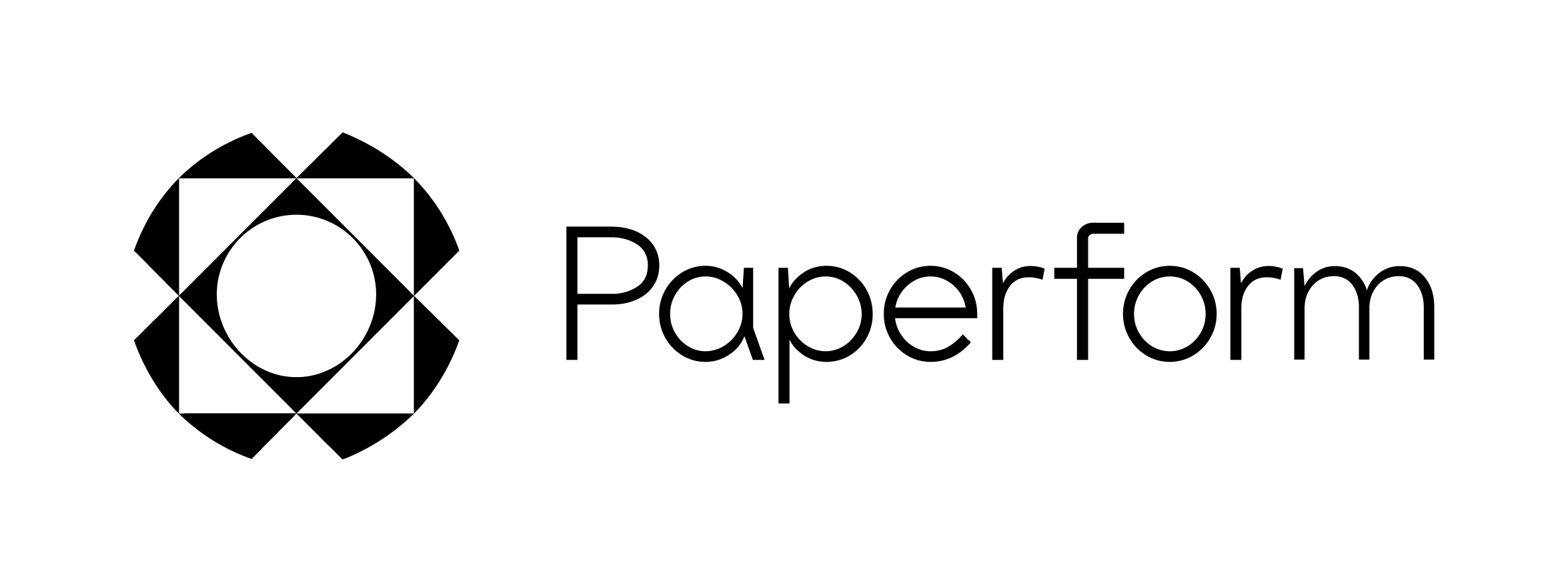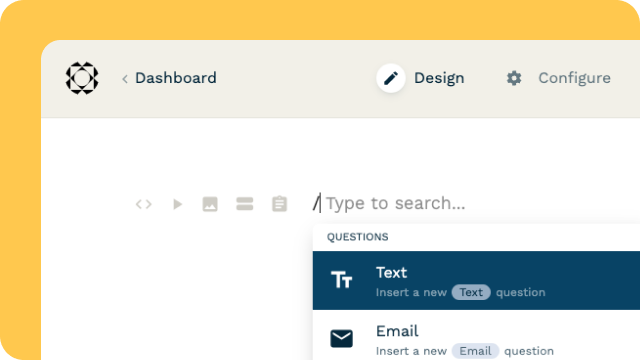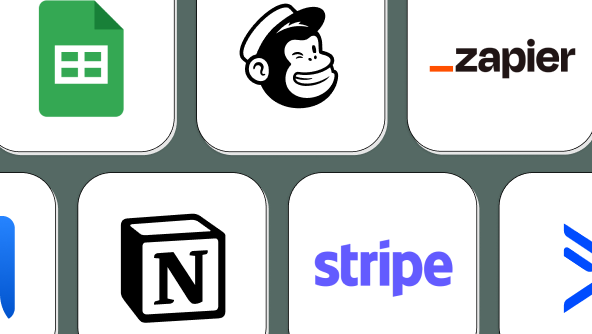
All Solutions

Explore all the solutions you can create with Paperform: surveys, quizzes, tests, payment forms, scheduling forms, and a whole lot more.
See all solutions











Connect with over 2,000 popular apps and software to improve productivity and automate workflows
See all integrationsProducts
Solutions
All Solutions

Explore all the solutions you can create with Paperform: surveys, quizzes, tests, payment forms, scheduling forms, and a whole lot more.
See all solutionsIntegrations

Connect with over 2,000 popular apps and software to improve productivity and automate workflows
See all integrationsResources
How to simplify work with intake forms

You know those tools you discover that—once you use them—you can’t help but wonder why you didn’t know about them earlier?
Intake forms are one of those tools.
They’re customizable enough to serve a ton of different use cases and easy enough to put together in a matter of minutes. Regardless of whether you’re a freelancer, solopreneur, a growing agency, or a new small business, you can use intake forms to create a streamlined and impressive client process that collects data for you.
Intrigued? Here’s what you need to know about intake forms (and how to seamlessly create them).
What's an online intake form?
An intake form collects all the relevant data a business needs to determine how to best provide its service. An online intake form does exactly the same thing, except rather than using a paper form, potential clients answer digitally.
You can find intake forms across a wide variety of industries, from accounting firms to doctor's offices. Chances are, you’re probably filled several out throughout your life. Some common examples include:
- Medical history intake forms
- Project intake forms
- New client forms
- Consent forms
- Graphic design service intake forms
What are the benefits of intake forms?
You can probably guess some of the benefits intake forms can provide to your workflow. Yet some key benefits are not so obvious.
1. Get access to key data upfront
Gathering all the relevant information from potential clients up front saves both you and them a headache.
With an effective client intake form customized to the needs of your business, you can vet customers quickly, and store data for easy access down the road.
2. Save resources
Time, money, and your team’s skills don’t have to be wasted with clunky manual data collection processes.
With intake forms, you can gather the right data easily online. No need to spend extra time finding yesterday’s client information, scheduling Zoom calls, or getting on lengthy phone calls.
3. Centralise your data with a project management tool
These days, most teams execute their goals and projects with the help of some sort of project management tool.
Once you connect your online forms with the appropriate folders and tasks, you’re setting up a smoother collaboration system that makes data accessible for your whole team, all from one central location.
4. Create a smoother onboarding experience
Onboarding new clients or new employees? A custom intake form is a great way to ensure the process is as thorough as possible. You can gather data quickly, and make sure no key questions go unasked.
5. Kickstart automated processes
Bring automation and intake forms together and you’re in for a real productivity treat.
You can use an integration to connect your intake form with your favourite apps to automatically update customer data in your CRM, or send a Slack message to your team when a new form is submitted.
Does your business need an intake form?
Many businesses can benefit from using an intake form, but service-based businesses tend to need them most. Why? Because services tend to be tailored to the specific needs of each customer. Since no one customer is the same, personalization through data collection is necessary.
Here are a few examples of service industries that could benefit from intake forms.
- Freelance service providers (designers, writers, videographers)
- Digital agencies (graphic design, marketing, content writing)
- Accountants
- Law firms
- Education (teachers, counsellors, childcare providers)
- Fitness businesses (personal trainers, gym owners, yoga teachers)
- Construction businesses
- Healthcare (doctors, dentists, physical therapists)
What should an intake form include?
What an intake form includes depends on the industry it's used in. A physician will ask different questions within an intake form from a copywriter. A freelance accountant’s intake form will look different from a fitness trainer’s form.
Having said this, one thing’s for sure: your intake form should go beyond a simple contact form. Sure, you should include the basic fields included in almost every intake form:
- Client name
- Date
- Email address
- Business name
But once you’ve included the basic intake form fields, take a moment to consider what additional questions you can ask that’ll help you provide a good or service.
What are the nuances of your industry worth getting more customer information about?
What recurring customer requests are you seeing that could be taken care of by gathering more specific data through an intake form at the beginning of your client onboarding process?
These might include:
- Emergency or primary contact
- Project-specific information (like budgets and deadlines)
- Additional comments/notes
- How did you find out about us?
- Specific design requests
Taking the time to round out your intake form with close-ended and open-ended form fields sets you up for success. Custom forms help you get the information you need to provide the best experience possible to your customers.
And by gathering this data from the get-go, you can avoid pestering customers with questions down the line.
How to use Paperform to create an intake form
At this point, you know all about intake forms and why they’re such a great tool for service-based businesses. Here’s how to use Paperform to make your first (and the rest) of your intake forms.
1. Create with the no-code editor
Paperform's no-code editor makes it easy to create intake forms that automate your business. No need to employ a whole tech team to develop intake forms with added complexity.
With Paperform, building an intake form is as easy as writing a document. Click anywhere to add one of our 25+ field types, including ratings, payment fields, and signatures.
Once you’re happy with your intake form, you can share the link directly with your customers, embed it in a pre-existing webpage, or host it as its own page on Paperform at no additional cost.
Form a better life now.
2. Add your brand colours
Paperform offers you the perfect balance of beauty and brains. You get all the advanced form behaviour you could need (like calculations and conditional logic) and all the design options you want.
You can personalise every element of your creation, from the font of the first letter to the look of your success page. Add and edit images, change colours, and play with themes from the configuration menu.
Paperform seamlessly matches the look and feel of my existing landing pages. With every other form builder I’ve tried, you can tell that the form has just been embedded onto the website. With Paperform, however, my forms look like they’re part of the website; they just blend into the page and represent my brand perfectly.
3. Use our templates
Don’t feel like starting from the blank page? No problem. Paperform has over 650 unique, designer-made templates for you to choose from. Each one is made with a particular use case in mind.
Check out these popular intake form templates:
- Patient intake form template
- Real estate client intake form template
- Massage client intake form template
- Tax preparation client intake form template
- Project requestion form template
4. Leverage integrations
With Paperform’s vast array of integrations, you can share data across platforms to automate everyday processes.
Organise and store client information from your intake form in a Notion Database, or send tasks directly to Trello to make managing clients easier.
Manage your team in Asana? Connect Paperform and ensure each card is populated with the corresponding client information automatically.
Here are just a few of the over 3,000 direct and Zapier integrations you can enjoy with Paperform.
- Paperform → Google Sheets: Collect new Paperform responses as rows on Google Sheets.
- Paperform → Trello: Create Trello cards from new Paperform responses.
- Paperform → Dropbox: Save new Paperform entries to Dropbox text files.
- Paperform → Mailchimp: Add new Paperform entries to a Mailchimp list.
→ 📹 More of a visual learner? Check out this step-by-step video to learn how to integrate Zapier with Paperform.
5. Streamline contracts with Papersign
Once you’ve nailed your intake form process, what’s next? In many cases, it's formalizing agreements and contracts with your clients. For this, we suggest Papersign, our new eSignature solution that takes the stress out of contracts.
By automating your contract management, you save time, reduce potential errors, and provide a professional experience for your clients.
With Papersign, you can send out documents that need signatures directly to your clients. Whether it's a non-disclosure agreement, a project proposal, or a formal contract, Papersign handles it all seamlessly.
The best part? Papersign works in harmony with Paperform. After gathering client information via an intake form , you can automatically trigger a contract to be sent through Papersign. Less manual work for you and a smoother experience for your clients.
Papersign offers a free plan so you can try it out for yourself. Get started free today and discover how easy contract management can be.
Intake forms made easy
Experience a seamless client management process by combining Paperform and Papersign. Create custom intake forms with Paperform, then automate contract management with Papersign.
These tools save time and enhance professionalism, offering your clients an impressively smooth experience from data collection to contract signing. Elevate your business to new levels of efficiency today.
Form a better life now.
Get your 7 day unrestricted trialSmileBox started in a bedroom and scaled to 30,000 orders. Here’s how founder Tom Wrench used Paperf...
When Kathleen Celmins launched her AI-powered app, GlowSocial, she quickly realized that building cu...
Paperform has been recognized as a 2026 G2 Best Software Award winner! It is an honour we are deeply...
Trying to decide between Zapier and Stepper? This in-depth comparison breaks down pricing models, wo...